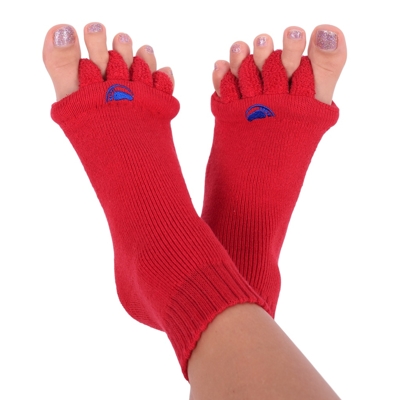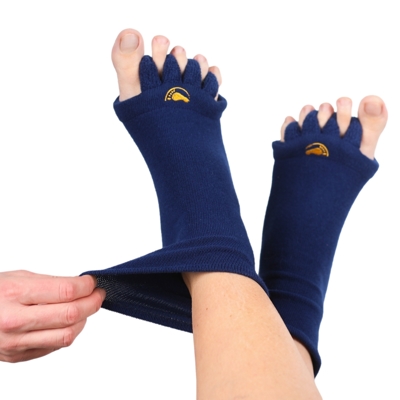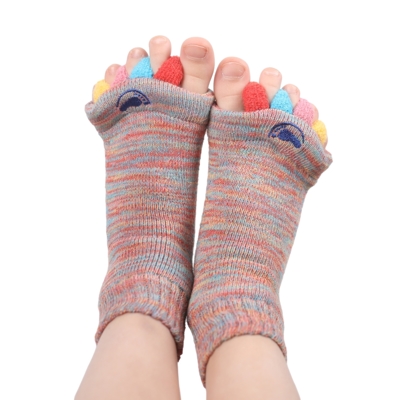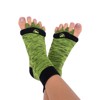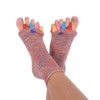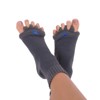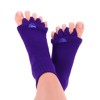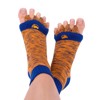Family physiotherapist Markéta Pechanová: When caring for your body, don’t forget about your mind
 Markéta Pechanová (née Škudrnová) has been a physiotherapist for almost 15 years. During the course of her career, she has worked at a number of hospitals, including the University Hospital in Plzeň or in Motol in Prague. She currently runs her own health-care facility in Klatovy, called Fyzioterapie Jinak (Physiotherapy Another Way). She specialises primarily in children, but describes herself as more of a family physiotherapist. What did she have to say about herself and what does she think about Foot Alignment Socks?
Markéta Pechanová (née Škudrnová) has been a physiotherapist for almost 15 years. During the course of her career, she has worked at a number of hospitals, including the University Hospital in Plzeň or in Motol in Prague. She currently runs her own health-care facility in Klatovy, called Fyzioterapie Jinak (Physiotherapy Another Way). She specialises primarily in children, but describes herself as more of a family physiotherapist. What did she have to say about herself and what does she think about Foot Alignment Socks?
How did you get into physiotherapy?
It was always my great dream to work in health care, so when I was choosing my secondary school, I opted for the secondary medical school, to study to be a general nurse. During my studies, I had work experience at most of the departments of the University Hospital in Plzeň and other hospitals nearby. I found the work with children very satisfying, but already by the time I was ready to graduate from “med school” I knew that my career would take a different path.
I applied to the Faculty of Health Care Studies at the University of West Bohemia in Plzeň and the course I opted for was clear, physiotherapy. Time passed and in 2009 I joined the University Hospital in Motol, where I then spent almost eleven years. During that time, I did a number of professional courses, and while I was working, I also completed my Master’s degree, was involved teaching students at the Second Faculty of Medicine of Charles University in Prague and after some years I became the Section Head for physiotherapists and ergotherapists.
I am incredibly grateful to have had the opportunity to work at the University Hospital in Motol, as the experience I gained there has obviously been very useful later in my career. A big thank-you goes to my colleagues, who took me in and did their best to pass on new experiences and their own know-how to me. I am of the opinion that practice is extremely important for all therapists.
In Motol, I worked at the children's physiotherapy outpatient clinic and went there every day to work with children in the inpatient department of the children's cardio centre and the neonatal surgery ICU, where I took care of children who were on pulmonary ventilators, and physiotherapy was an integral part of their care.
On your website you say that you changed your professional approach after several years of practice. What led you to do that?
It’s true that I started to experience problems with my health after some time spent working in Prague. I began to be more frank with myself and admitted that working in the hospital wasn’t as pleasant or rewarding as I’d imagined for such a beautiful field as physiotherapy.
Over the years, one hears so many life stories that it was important for me to stop for a moment, take a breath again and realise that I needed a change. After all those years in Motol, I lost my sense of satisfaction in my work and decided to return home. Home to Šumava.
In 2019 I opened a non-state medical facility in Klatovy (Czech Republic), called Fyzioterapie Jinak (Physiotherapy Another Way).

Why Physiotherapy Another Way?
As I mentioned earlier, during my years of practice I did a number of specialised courses that certainly enriched me in some way, but they were still lacking something. And that was what I found in 2016 in the course Craniosacral Therapy through Deep Relaxation.
I’d say that it was this course that led me to change my previous professional approach and general view of physiotherapy and how the human body works.
Nowadays everyone wants to be healthy. Naturally, so do I, but not everyone is willing to do something to stay in good health. We want to have everything immediately, but we so often fail to realise that what seems to us to be a “health problem” is not just a matter of one day, but reflects the fact that we have long neglected our body and our mind.
We are living in a hectic time, when many people are constantly in a rush to get something done. We often put our health last and don’t really think about it until we feel signs that something isn’t right. We don’t tend to notice it until that happens.
I wanted to create a place where I’d have plenty of time for my clients and would be able to take an interest in why they are coming to see me, what they expect from the visit and how I can help them. I believe I’ve succeeded in creating that very place.
What are you currently working on? What patients most often visit you?
For quite a few years I presented myself as a children’s physiotherapist. I’d now describe myself as a family therapist. As tends to be the case, parents come for a consultation with their newborn baby and then they themselves start going to therapy, as we all suffer from certain pains, both physical and mental.
My clinic is open to people of all ages, although obviously most of my clients are children.
What are the most common ailments that the child patients that you see tend to have?
That's a difficult question, but at my clinic I probably most frequently see children with neurological problems, children with cerebral palsy, spinal muscular atrophy, rare genetic syndromes, and so on. I also examine and then treat children's feet (podoscope examinations, physiotherapy, plus I make individual insoles where necessary).
However, I also greatly welcome preventive visits, which are very popular with parents.
We discuss their child's current motor development, and if they are unsure how to handle their child (I don't like that word), how to turn them on their tummy, how to pick them up when they are not yet able to climb - how to encourage climbing, and much more.
I'm here to give parents confidence that whatever they are doing, they are doing the best they can at the time. If necessary, I'm happy to show them how to do some techniques differently. I explain to them that the fact that they have sometimes unwittingly done something less than ideal does not mean that they have ruined their child's motor development and life.

I set two days a week aside to focus solely on craniosacral therapy, which is more used by adult clients (parents), and where we try to put the whole family into balance and address the root causes of their health problems.
So, I have one plea for everyone: “When caring for your body, don’t forget about your mind.”
Try to be aware of the beautiful things in your life and seek joy in every single day. You might be surprised.
What do you like best about your work?
I'd say that even at my age I still believe in fairy tales and happy endings. That's why what I like most about my job is that even if the parents are told by the doctors that their child will never walk, and then that child walks up to my clinic on the second floor office and doesn't need to take the lift, is that a miracle? Hope? That everything has meaning and it's important not to give up.
The fact that I go to see my client with cerebral palsy doing a dance class, and I see the joy they take in life and movement? Yes. That's what I love most about my job. Then I tell myself that what I'm doing really does make sense.
Of course, life is not always so rosy, I'm aware of that. I have a lot of respect for the parents, for everything they're able to achieve. And I thank them for putting their trust in me and letting me take care of what is most precious to them, their child.

And what, on the other hand, don’t you like about your job?
I feel that these days there's a huge trend for various coaches and self-proclaimed experts on everything. Social media is teeming with various guides on how to look after yourself or your child. However, not all this information is trustworthy and it can cause great uncertainty in my clients (parents). All that these 'guides' achieve is that people leave their intuition aside, along with their common sense. I understand that they want the best for themselves and their baby, but sometimes they get lost in the overwhelming flood of information.
Here I’d say that that there’s a lot of truth in that lovely Czech saying “Trust, but verify”. That would be a good motto when choosing one’s therapist.
It’s important to sit down with your therapist and talk, person to person. After all, my patients’ visits tend to be very personal and we spend a lot of time together. So, if there’s something about your therapist that isn’t quite right for some reason, and you don’t feel at ease and safe with them, it’s perfectly okay to change therapists. As my friend says, “You can’t please them all”. Likewise, I and my opinions won’t necessarily suit everyone and that’s absolutely fine. We're all different.
You yourself wear The Foot Alignment Socks with a loose cuff. Why do you wear them and how do they help you the most? Would you recommend them to others?
You can’t beat your own experience, and so when I want to recommend something to my clients, I try it for myself first. I was curious about Alignment Socks, as I sometimes suffer from lymphatic swelling. I spend most of my working day on my feet and for me personally Alignment Socks are a great way of reducing the swelling and improving circulation.

I think the effect can be seen in the attached photo and what joy it is for a woman when her ankles are suddenly visible again. Of course, it’s important to mention that “only” wearing Alignment Socks will not completely resolve the problem.
Yes, I am very happy to recommend Foot Alignment Socks to anyone interested in their feet and their health. I recommend them as a form of prevention, as well as in treating various diagnoses.


